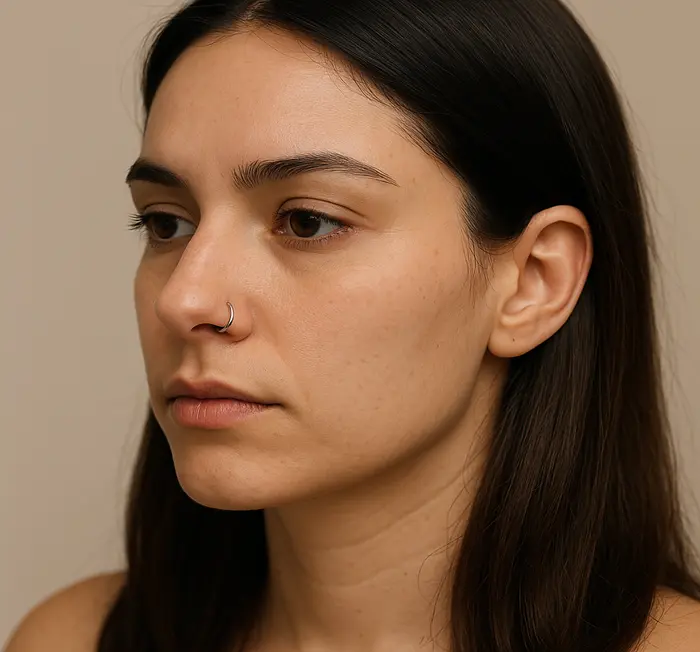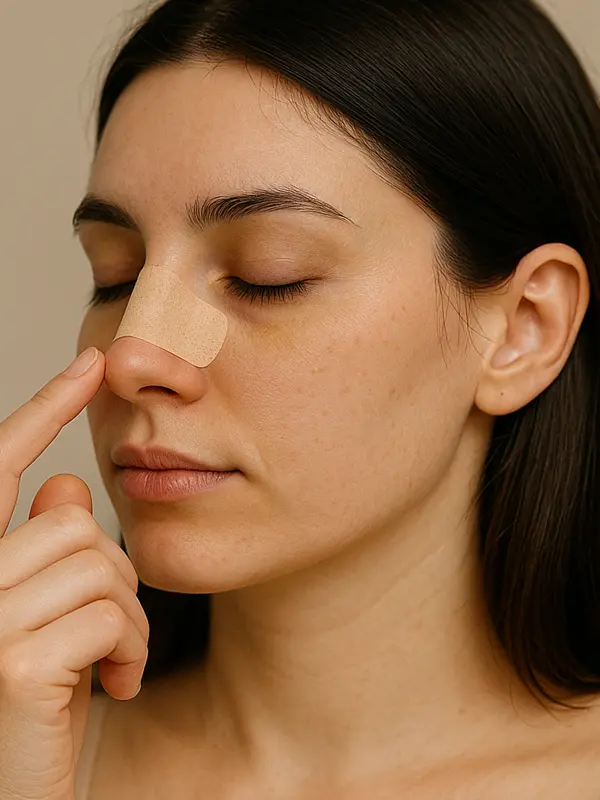Can I get nose job with nose piercing? This is one of the most common questions patients ask when planning their cosmetic surgery journey.
If you're considering rhinoplasty but have a nose piercing, you might be wondering: can I get nose job with nose piercing? This is one of the most common questions patients ask when planning their cosmetic surgery journey. The short answer is yes, but there are important considerations and steps you'll need to take to ensure a safe, successful procedure.
Rhinoplasty, commonly known as a nose job, is a surgical procedure that reshapes the nose for aesthetic or functional purposes. Having a nose piercing doesn’t automatically disqualify you from undergoing this transformative surgery, but it does require careful planning and preparation.
The relationship between nose piercings and rhinoplasty surgery involves several medical considerations that your surgeon will evaluate during your consultation. These factors ensure your safety and optimize your surgical outcomes.
Yes, you will need to remove your nose piercing before rhinoplasty surgery. This is a non-negotiable requirement for several important reasons:
● Infection prevention: Jewelry can harbor bacteria that increase infection risk during surgery
● Surgical access: Piercings can interfere with the surgeon’s ability to perform precise work
● Safety concerns: Metal jewelry poses risks during surgery, including potential interference with medical equipment
● Healing optimization: Removing jewelry allows the piercing site to heal properly alongside your surgical incisions
Most surgeons recommend removing nose jewelry at least 1-2 weeks before your scheduled rhinoplasty to allow the piercing site to begin healing.
Nose piercings, even well-healed ones, can potentially complicate rhinoplasty surgery. The piercing site represents a break in the skin’s natural barrier, which could serve as an entry point for bacteria. Additionally, if your piercing is infected or inflamed at the time of surgery, this could significantly increase your risk of complications.
Before scheduling your rhinoplasty, ensure that:
● Your piercing is completely healed and free from infection
● There are no signs of inflammation, discharge, or irritation
● You’ve maintained proper piercing hygiene
● Any piercing-related complications have been fully resolved
Long-term or multiple nose piercings can create scar tissue that may affect your surgical outcome. Scar tissue is less flexible than normal skin and may not respond to surgical manipulation in the same way. Your surgeon will:
● Assess any scar tissue during your consultation
● Determine how it might impact your desired results
● Plan surgical techniques accordingly
● Discuss realistic expectations for your specific situation


After rhinoplasty, your nose will need time to heal properly. The initial recovery period typically involves:
● Swelling and bruising for the first 1-2 weeks
● Wearing a nasal splint for about one week
● Following strict post-operative care instructions
● Avoiding any trauma to the nose area
During this time, the piercing site will also be healing, which actually works in your favor for overall recovery.
Complete rhinoplasty healing can take up to a year, though most visible swelling subsides within a few months. The piercing site will typically heal much faster, often within 4-6 weeks of jewelry removal.
This is one of the most frequently asked questions about getting a nose job with nose piercing. The timeline for re-piercing depends on several factors:
Most surgeons recommend waiting at least 6-12 months after rhinoplasty before considering re-piercing your nose. This allows for:
● Complete healing of surgical incisions
● Resolution of swelling
● Stabilization of your final nose shape
● Reduced risk of complications
● Healing speed: Individual healing rates vary
● Surgical complexity: More extensive procedures may require longer waiting periods
● Location of piercing: Some areas may heal faster than others
● Overall health: Your general health affects healing time
Before re-piercing, schedule a consultation with your rhinoplasty surgeon. They can:
● Assess your healing progress
● Identify the safest piercing locations
● Advise on optimal timing
● Recommend experienced piercers familiar with post-surgical anatomy

When you have a nose piercing and want rhinoplasty, selecting a surgeon experienced with such cases is crucial. Look for a specialist who:
● Has extensive experience with rhinoplasty procedures
● Understands the complexities of pierced nose anatomy
● Can address your specific concerns and expectations
● Maintains high safety standards and protocols
Be completely transparent with your surgeon about:
● Your piercing history (when, where, how many times)
● Any complications you’ve experienced
● Your plans for future piercings
● All medications and aftercare products you’ve used
Turkey has emerged as a leading destination for medical tourism, particularly for aesthetic procedures like rhinoplasty. The country offers a unique combination of cutting-edge medical technology, world-class healthcare facilities, and highly skilled surgeons who stay current with international best practices. Turkish hospitals maintain stringent safety standards and accreditation from international medical organizations, ensuring patients receive care that meets or exceeds global standards. The competitive healthcare environment in Turkey has fostered innovation and excellence, making it an attractive option for patients seeking high-quality rhinoplasty procedures.
The medical infrastructure in Turkey, particularly in major cities like Istanbul, features state-of-the-art facilities equipped with the latest surgical technologies and diagnostic equipment. Many Turkish plastic surgeons have trained internationally and bring diverse expertise to their practice, often speaking multiple languages to better serve international patients. The comprehensive approach to patient care, combined with competitive pricing and the opportunity to recover in a culturally rich environment, makes Turkey an increasingly popular choice for those considering rhinoplasty, especially for complex cases involving previous piercings or revision surgeries.
For patients seeking expert rhinoplasty care in Turkey, Doç. Dr. Osman Halit Çam represents the pinnacle of surgical expertise and patient care. As an Otolaryngology – Head and Neck Surgeon with 16 years of extensive experience, Dr. Çam has successfully performed over 5000 surgeries throughout his distinguished career.
His credentials include completing a specialized rhinology fellowship in the United Kingdom, where he refined his techniques and gained exposure to the latest international standards in nasal surgery. Currently practicing in Istanbul, Turkey, Dr. Çam focuses exclusively on facial aesthetic procedures, including rhinoplasty,
blepharoplasty, lip lifts, neck lifts, and buccal fat removal, ensuring that each patient receives specialized care tailored to their unique needs and aesthetic goals.
Areas of Expertise

"Rhinoplasty offers an aesthetic and functional appearance by providing facial harmony."
"Rhinoplasty offers an aesthetic and functional appearance by providing facial harmony."
Detailed Info"Sinusitis is a painful condition caused by inflammation of the sinuses around the nose."
"Sinusitis is a painful condition caused by inflammation of the sinuses around the nose."
Detailed Info"Tonsil diseases are conditions that cause infection and swelling in the throat."
"Tonsil diseases are conditions that cause infection and swelling in the throat."
Detailed Info"Adenoids in children are enlarged lymphoid tissue that can cause nasal congestion."
"Adenoids in children are enlarged lymphoid tissue that can cause nasal congestion."
Detailed Info"Botulinum Toxin provides a youthful and smooth appearance on the face by reducing wrinkles."
"Botulinum Toxin provides a youthful and smooth appearance on the face by reducing wrinkles."
Detailed Info"In children, otitis media can cause earache and hearing problems."
"Facial rejuvenation with non-surgical methods reduces wrinkles and revitalizes the skin."
"Facial rejuvenation with non-surgical methods reduces wrinkles and revitalizes the skin."
Detailed Info"Sleep apnea is a disorder that causes breathing pauses during sleep."
At Dr. Osman Halit Çam’s clinic, we offer internationally recognized, patient-centered care with cutting-edge techniques in modern rhinoplasty and facial aesthetics.
From consultation to recovery, our mission is to provide personalized treatment in a safe, comfortable, and world-class medical environment.
Health innovations, treatment processes, and the latest news about our clinic are shared here.
A Comprehensive Guide to Rhinoplasty Correction Nose Job for Crooked Nose Nose job for crooked nose correction, understanding the procedure, benefits, and what to expect can help you make an informed decision about this transformative treatment. Get Info Nose job for crooked nose A crooked nose can significantly impact both your appearance and quality of […]
Your Complete Guide to Rhinoplasty and Piercings Can I Get a Nose Job with Nose Piercing Can I get nose job with nose piercing? This is one of the most common questions patients ask when planning their cosmetic surgery journey. Get Info Can I Get a Nose Job with Nose Piercing? If you’re considering rhinoplasty […]
What Older Adults Need to Know About Nose Surgery Rhinoplasty When You Get Old Rhinoplasty when you get old presents unique considerations that differ significantly from procedures performed on younger patients. Get Info What Older Adults Need to Know About Nose Surgery Rhinoplasty when you get old presents unique considerations that differ significantly from procedures […]
Each of the contents on this site has been prepared for informational purposes. Do not apply any of the treatment methods described on the site without the supervision of a doctor. Otherwise, the site management and Assoc. Prof. will not be responsible in any way for any problems that may arise. Dr. Osman Halit Çam is not responsible.
© 2023 – All Rights Reserved. Assoc. Dr. Osman Halit Cam
Last Updated: 25.07.2025